

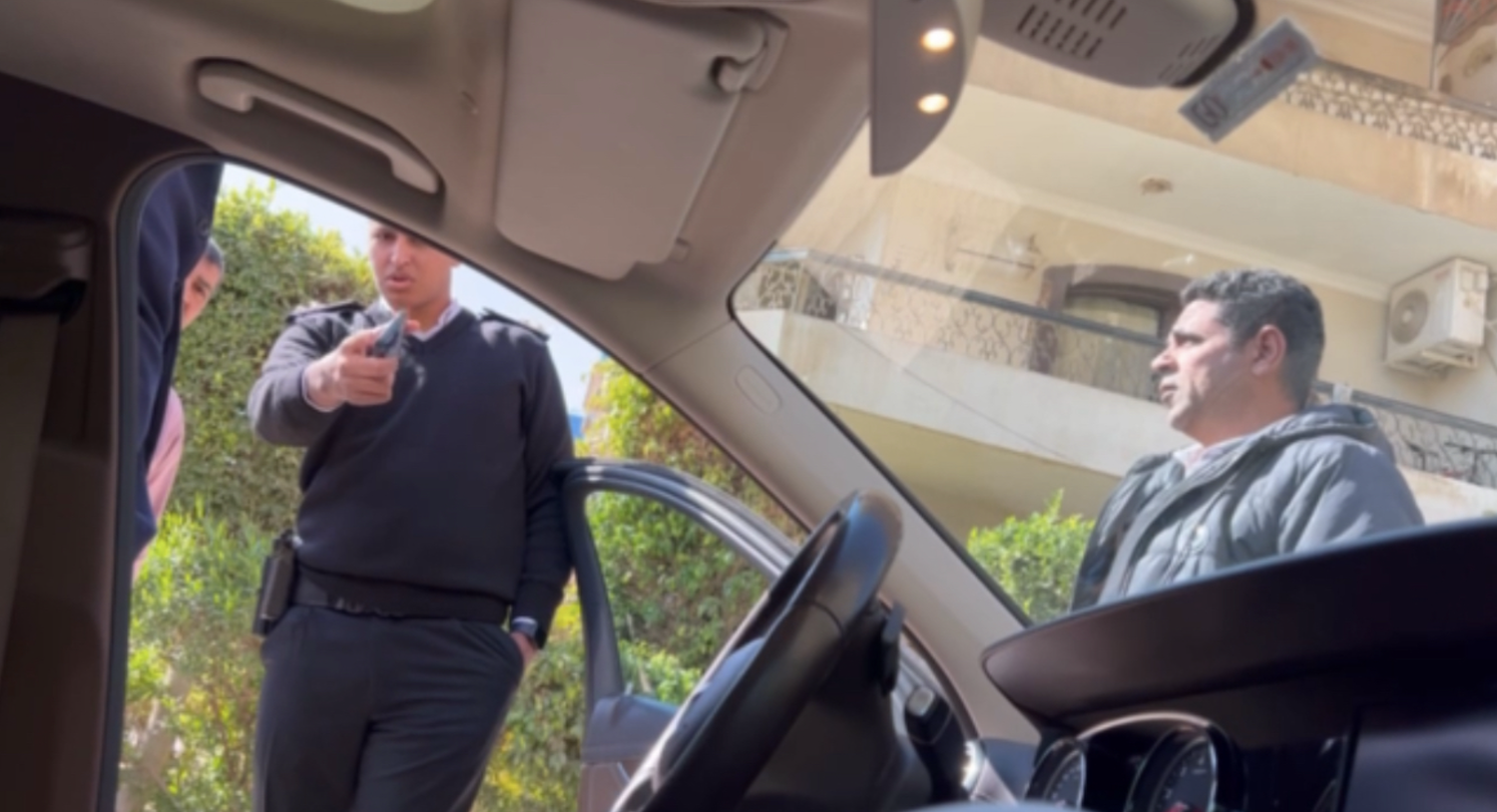
For some years now, I have been tracking globalist initiatives at both ends: at the point where the ideological rounds are chambered and downrange where they affect the lives of millions as public policies. This has taken me from places like Davos, Switzerland, where the World Economic Forum meets annually, to cartel towns in Colombia where illegal aliens board Zodiacs bound for the Darién Gap and thousands of them simply disappear.
I’ve also been tracking how USAID, the United States Agency for International Development, via a series of NGOs, has been running what amounts to a massive human trafficking operation across South America, through Central America, and straight up through our borders. President Trump is working to hold accountable those responsible, but there is so much more to the global workings of this clandestine government agency.
A Visit to the USAID in Egypt
I recently traveled from Davos to the ancient city on the Nile. With USAID’s nefarious activities dominating the news, I decided to visit its Cairo office to see how it was responding to Trump’s recent order slashing USAID activities.
To call USAID Egypt an office is misleading. It is a military-style compound.
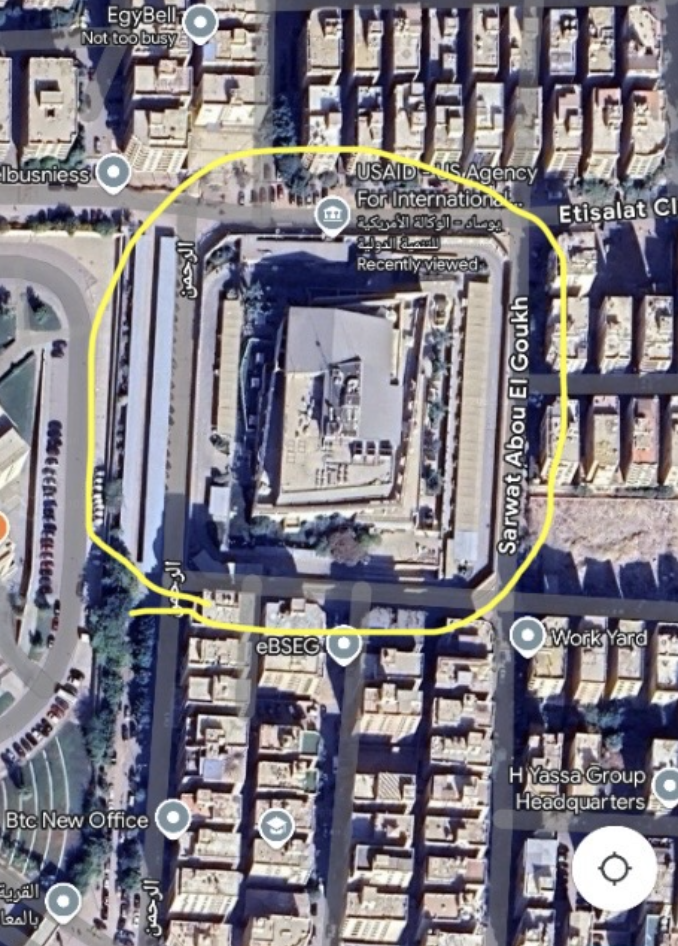
My Egyptian driver, Mohamed, and I approached the boom gate where security guards stood in a small guardhouse of the type you see all over the world. They raised the gate arm and waved us through. (I’ve found that the key to entering government buildings, much like the World Economic Forum, is simply to walk in as if I own the place. More often than you might think, security just steps aside.)
Mohamed zigzagged the Mercedes van through the suicide bomber barriers, we parked, and I told him to wait while I went inside to chat with USAID personnel. There was no USAID signage I could see. The facility was a fortress with high block walls topped with metal spikes and cameras. I walked the perimeter of the compound looking for the entrance, taking video as I went.
Finding it, I walked casually past the security guard and entered, snapping a picture of the USAID signage within. Here another security guard greeted me, asked if I had an appointment, and requested my identification. I said no and gave him my driver’s license. He looked at it briefly and handed it back.
“What is your business?”
I was, I said, investigating the activities of USAID and, since I was in Cairo, wondered what they did here and how they were responding to President Trump’s executive order.
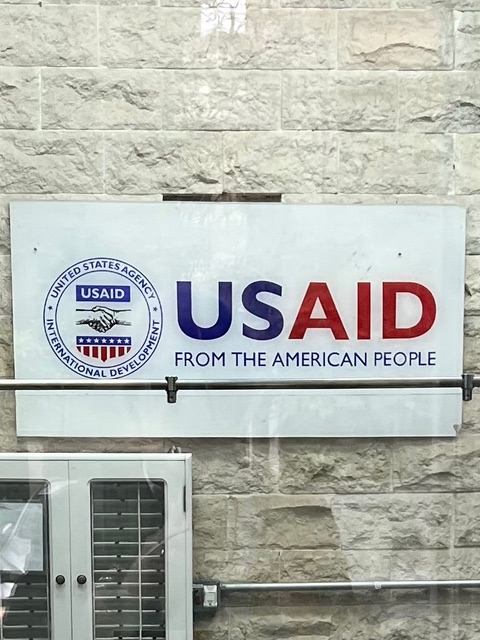
Nervous eyes darted. The security guard whispered, “I don’t think I should talk to you.”
I told him he probably shouldn’t then — at least not here on camera. Perhaps he or one of his colleagues would like to speak to me away from the office?
“I should call my supervisor.”
It seems USAID security was trained for every contingency except that of an American citizen showing up at an American government agency — an agency, mind you, that is supposed to be something like the governmental equivalent of Samaritan’s Purse — and asking mundane questions.
One of the two receptionists invited me to sit down to prevent me from overhearing the phone conversation. As the security guard spoke quietly and nervously on the phone, a host of people came and went through the foyer. Whatever they were doing here, shut down they were not.
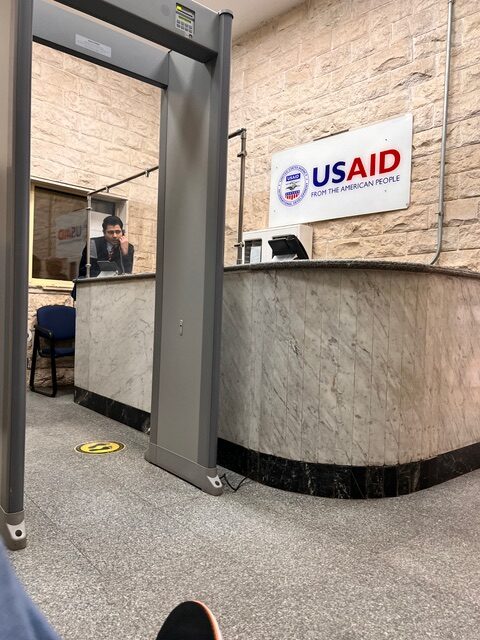
Hanging up, the security guard asked for my identification again. I told him he’d seen it once and that was enough. Things went downhill from there. Intuition told me they wanted to detain me, so I promptly left the building, returned to the van, and Mohamed and I departed.
At this point I should say I am a seasoned traveler. I’ve been in roughly 70 countries, all over the Middle East and some of the most dangerous parts of Africa, South America, and Central America. Born on a military base and raised on others, I am more than a little familiar with military security, war zones, and even NATO installations housing nuclear weapons. So in case there were any further attempts to detain me, I posted the story on X, where it went viral.
A Second Visit
A week later, I returned. This time I was in a Mercedes sedan and had no intention of entering the compound. I just wanted to drive by to confirm a couple of impressions. Security, recognizing me, came out from beyond the boom gate, stopped the vehicle, and ordered my driver and me to get out.
As an Egyptian national, Mohamed (wisely) did as he was told. I didn’t move.
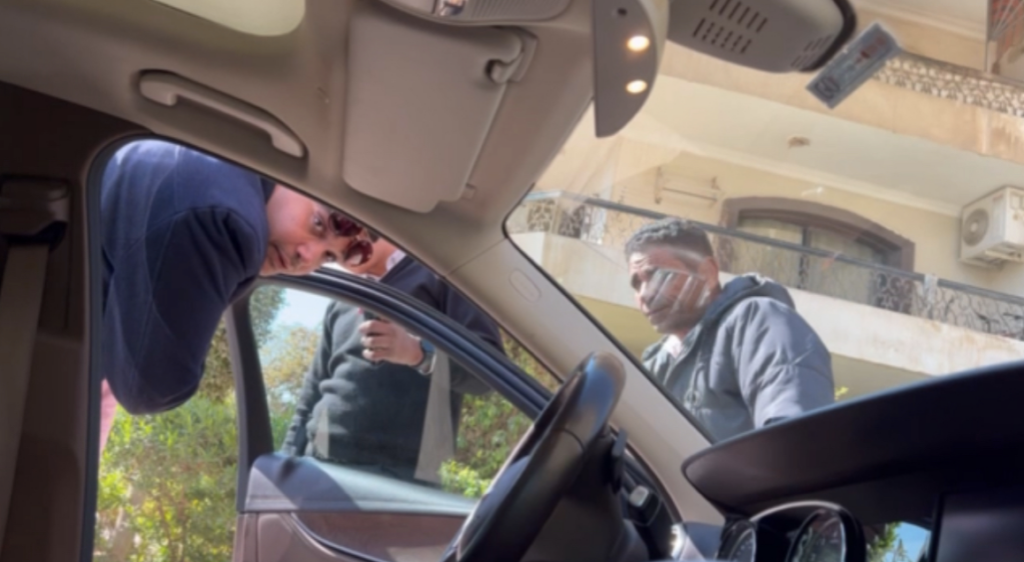
“Mohamed,” I said, “throw me under the bus. You are merely my driver, and I, your American client, told you to drive me here, got it?” All of this was true. He nodded and shut the door.
“You were taking video!” a security guard said accusingly. True — but of nothing that wasn’t on Google Earth.
Demands for my passport and phone followed, and I declined. For the uninitiated, your phone is your connection to the free world, and surrendering your passport means you cannot leave the country. Secret police in the Third World seize these as a preliminary move to arrest. Once in their possession, they can arrest you at their leisure. In the meantime, you sweat. It’s one of the oldest and most effective means of terrorizing foreigners.
“You might be a terrorist,” one said.
“You think I’m a terrorist? Really? I am American writer, and my tax dollars pay your salary.”
“That is true, but —,” he said no more.
One of the security guards smirked and quickly turned away. There was a kind of quiet acknowledgment that the terrorism accusation was ridiculous even if it would give them carte blanche to do with me as they wished — which was nothing good.
I would, I said, allow them to see my passport at a distance to confirm my identity, something they already knew. They again demanded that I exit the car and surrender my phone and passport. Some of them were visibly armed, but so far, no weapon had been unholstered.
“No.”
An intense two-and-a-half-hour standoff followed.
Seeing that it was futile to try to get me out of the car and walk willingly into the USAID compound, they told Mohamed to drive me the 30 or so meters past the gate. I told him he would do no such thing, and he instead opted to smoke a cigarette at a safe distance.
It’s important to understand that these were Egyptian security guards employed by USAID. Rent-a-cops. They had no authority outside the facility. They were on the phone with someone inside USAID who was giving direction.
This isn’t my first encounter of this kind, and there is a pattern to these things that is the same the world over: The older, more senior the officials with whom you are dealing, the darker your prospects become. The social media savvy young guns typically Google you, see you’ve been on American television, assume you are famous, and ask for a selfie. But if you start getting bumped up the food chain by the Russian FSB or China’s Ministry of State Security, you’re just a few short steps from a gulag.
In this case, things escalated quickly. Whoever was calling the shots inside USAID called Cairo police and, close on their heels, the NSA, Egypt’s infamous secret police. The National Security Agency — sometimes referred to as, ironically, Homeland Security — is the successor to the brutal SSIS: State Security Investigations Service, Egypt’s equivalent of the KGB. Indeed, NSA agents were trained by them, and, just as the KGB reemerged in the post-Soviet era as the FSB, the SSIS likewise simply rebranded after the Arab Spring of 2011 toppled Egyptian President Hosni Mubarak. Secret police in totalitarian regimes are a kind of brotherhood who operate outside the law.
From the outset of the NSA agents’ arrival, one guy was aggressive, trying, I think, to provoke an altercation. My passport and phone were once again an issue, and I again refused to hand them over. As I held my phone tightly, he pushed it to my face to unlock it, but that was pointless. For this reason, I have never activated iPhone’s facial recognition feature, and I had no intention of giving him the old-fashioned code to unlock it.
When he left to consider next moves, I called the U.S. Embassy in Cairo. The man answering the call was unhelpful.
“Have they arrested you?” he asked.
“No.”
“Just drive away.”
This was a very American answer to a very un-American situation. Egyptian authorities had already indicated they would fire on the vehicle if we attempted to leave. I hung up, my circumstances as bleak as ever.
Throughout all of this, I was surreptitiously videoing whatever I could. With the NSA man huddling up with the security personnel increasingly surrounding the car, I began firing off the videos one by one to my colleague Laurence Fox and others.
Cellular reception in the Third World is iffy at best, but Mohamed had, at the last minute, equipped the car with Wi-Fi. Silently, I prayed: Send! Send! Send! Sooner or later, they would inspect my phone. Hurriedly, I went into my photos app and deleted the offending videos and photos. Fox and others had them now. Just in case whoever inspected the phone was tech-smart, I went to “recently deleted” and trashed them permanently.
I had three cards to play, none an infallible protection. The first was mystery. They had no idea what I had or had not seen or to whom I had or had not communicated it. The second was the fact that I was a U.S. citizen — a thin bulwark but real. Had I been, say, a Nigerian or an Egyptian, I wouldn’t have made it this far. All passports are not equal. And, finally, I was forcing the issue: I wouldn’t move until they charged me with a crime or let me go. This carried risks, but the alternatives were no better.
Where USAID security had used the claim that I was a terrorist to hold me, the NSA men, older and smarter, never indulged this fantasy. They knew I was an author and freelance columnist who possessed no weapons, and not since Stonewall Jackson have Presbyterians made a habit of blowing things up.
This accusation was quickly dropped in favor of another: espionage.
I freely admitted it to the NSA man: “Yes, I am spying. On my government, not yours” — a cheeky reply but one that clearly caused some consternation.
“Do you have an Egyptian government permit to take photos of Egyptian government buildings?” he asked.
“No.” He briefly looked triumphant. “But I’m not taking photos of Egyptian government buildings. That,” I pointed in the direction of USAID, “is an American government building, and I am an American.”
Annoyed, he left again, pacing on the phone. They clearly did not know how to proceed, and while being charged with espionage is a terrifying prospect, I knew it was problematic for them because it would be a tacit admission that there was more than pallets of rice and canned goods behind the high spiked walls of USAID in Egypt.
Mohamed got back into the Mercedes and locked the doors.
“You know,” I said to him, “the worst part of this might be the fact that I have to pee.”
“Me too!”
He departed for another cigarette and then came back. The NSA, as if to be conciliatory, had given him an offer to relay to me: “They want you to enter the compound and go into their office and sign an ‘incident report.’”
We exchanged knowing looks.
“Is it in Arabic?”
“I don’t know. I will ask.”
“If it’s in English,” I said, “I’ll read it. But I’m not entering the USAID compound. They can bring it to me here.”
He went to speak to them and returned. “They say you must enter their office and review it there. It is in Arabic, and they will not let me translate for you. Only you can go.”
My reply was indelicate. Mohamed concurred: “Yes, I do not think you would come back.”
The NSA man once again stood at the passenger side door of the sedan to again demand my phone. “You can’t have it. But I will let you look through my photos and videos while I hold it.”
He waved over a not-so-plainclothed Cairo policeman, their tech guy, who looked exactly like Freddie Mercury in a leather jacket and aviators.
I held the phone while he examined the photos — of family, pyramids, feluccas, Tutankhamun artifacts, and other typically touristy stuff. He paused briefly on a Nile cruise belly dancer — this Freddie Mercury wasn’t gay — and then, just as I thought he might, he scrolled down to “recently deleted” for a final inspection. He turned to the NSA man and indicated there was nothing.
Shortly thereafter, the NSA man received a call from, I am reliably informed, “someone in a very high position,” and Freddie Mercury was sent over to my window: “USAID is closed today, and there is no one here. We are sorry, but you cannot visit today. Have a good day.”
Just like that, we were released.
But it wasn’t over. The next day, the secret police showed up at the car service asking questions about me. Truthfully informed that I had left the country, they proceeded to interrogate Mohamed about my activities: Where did he go? With whom did he associate? What did he tell you? In the end, the NSA rightly concluded that he was merely my driver, nothing more. The Mercedes was then thoroughly searched. Exactly what they were hoping to find is unclear.
What to Make of This
Safely out of the country, there are several takeaways from this incident. The first is that this is how an intelligence agency behaves, not a benevolence arm of the United States. USAID security guards had been embarrassed by my previous visit where I had breached their security, not by force but with their assistance. This was, for them, a kind of payback. But neither Cairo police nor the NSA had any interest in that. Indeed, they treated USAID security contemptuously.
The second is that I was, I think, dealing with three governments: the authentic U.S. government represented by the naïve fellow who took my call at the U.S. Embassy, the Egyptian government represented by Cairo police and the state security apparatus, and the shadow government represented by whoever it was inside USAID that had the NSA on speed dial. President Trump doesn’t yet have all his own people in place, and the deep state, as real as any branch of government, is deeply embedded. Nowhere is that truer than in the corrupt USAID.
The third is the desperate attempts to get me to enter the USAID compound. One had the feeling they were trying, to quote Fox, to “Jamal Khashoggi” me. Khashoggi, a Saudi journalist, entered a Saudi consulate in Istanbul of his own accord and was there murdered by his own government.
Finally, this was a monumentally stupid response. Had the USAID office, on my first visit, simply said something like, “Yeah, President Trump is slashing the USAID, and we are in the process of closing shop,” there would be no story here. But the fearful, reactionary response smells of corruption. This was the Streisand effect, initiating calls from high in our government to ask: What the hell is going on at USAID in Egypt?
I will leave that question unanswered. But with war in Gaza, Trump’s plan to resettle Palestinians, and mounting evidence that USAID has been funding not only the invasion of the United States by illegal aliens but the very demise of our republic and even terrorism, the destruction of this rogue agency cannot come soon enough.
